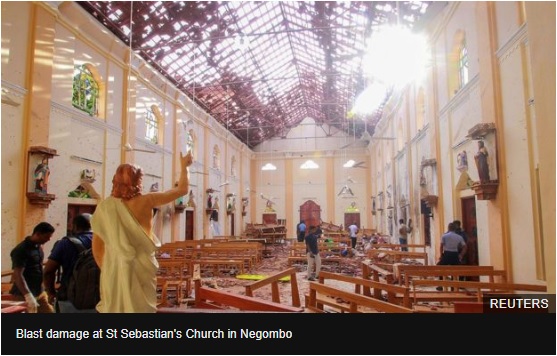
The death toll in Sri Lanka has soared to 290 after a wave of blasts hit churches and luxury hotels across the country on Sunday.
Police said 24 people had been arrested, but it is not yet known who carried out the attacks.
About 500 people are injured and dozens of foreigners are among the dead.
The country is in shock after the Easter Sunday bombings, the deadliest violence since the end of the civil war in 2009.
Late on Sunday Sri Lankan Prime Minister Ranil Wickremesinghe said security services had been "aware of information" of possible attacks but that the information had not been acted upon.
How did the attacks unfold?
The first reports of explosions came at about 08:45 local time (03:15 GMT) - with six blasts reported within a small space of time.
Three churches in Negombo, Batticaloa and Colombo's Kochchikade district were targeted during Easter services and blasts also rocked the Shangri-La, Kingsbury and Cinnamon Grand hotels in the country's capital.
As police hunted those responsible, two further explosions were reported.
One blast hit near the zoo in Dehiwala, southern Colombo, and an eighth was reported near the Colombo district of Dematagoda during a police raid, killing three officers.
Late on Sunday, the air force said an improvised explosive device had been found and disposed of close to the country's main airport in the capital, Colombo.
"A PVC pipe which was six feet [1.8m] in length containing explosives in it was discovered," spokesman Gihan Seneviratne told local media.
What's known about the attackers?
It remains unclear who was behind the attacks. There is also no information on the identity of the 24 people arrested.
The government has said they believe suicide bombs were used at some of the sites.
The BBC's Azzam Ameen in Colombo says the attackers are thought to be part of a "radical extremist Islamist group" according to authorities.
Addressing rumours that officials had had prior intelligence of forthcoming attacks, Mr Wickremesinghe said: "We must look into why adequate precautions were not taken. Neither I nor the ministers were kept informed."
There was also a temporary restriction on some social media networks to try and stop misinformation spreading.
Who are the victims?
The vast majority of those killed are thought to be Sri Lankan nationals, including scores of Christians who died at Easter church services.
The ministry of foreign affairs says it believes 36 foreign nationals are among the dead, with most still unidentified at a Colombo mortuary.
The international victims include:
- At least five British citizens - including two with joint US citizenship
- Three Danish citizens
- One Portuguese citizen and six Indian nationals
- Two engineers from Turkey, according to Turkish news agency Anadolu
- Two Chinese nationals, according to the China Daily
- One person from the Netherlands
- One person from Japan, according to Japanese media citing government sources

